With Gray, Palmiotti, and Conner’s run now at an end after one full year, it seems like a good time to look back at Power Girl issues one through twelve. For those unfamiliar with the character, Power Girl is a female version of Superman that somehow avoided being Super Girl or Super Woman. With cleavage. There’s no avoiding that DC wants to put this character on covers to draw the eye of lonely young men and dirty old men alike.
My first recollection of her was from the old Justice League Europe series, where I recall her repeatedly provoking and being provoked by Guy Gardener. If you aren’t familiar with Guy Gardener, it suffices for my purposes to describe him as the chauvanist pig Green Lantern from the 1980’s. Power Girl and Guy made good foils for each other, because they have somewhat aggressive personalities, and both are derivative characters that refuse to behave like they are.
Anyhow, in 2009 a new Power Girl series came out that, like Terra before it, was co-written by Justin Gray and Jimmy Palmiotti, and illustrated by Amanda Conner. Also like Terra, it manages to side-step the landmine field that is DC’s continuity-porn train-wreckage of a history. This is an accomplishment given Power Girl’s role in the Infinite Crisis of Worlds in Crisis Infinitely. They simply and accessibly put forward a character that gradually putting her life together both as a super-heroine and a secret-identity entrepreneur.
The title goes through four plot arcs, tying up as tidily as if they expected the comic to be canceled entirely after its first year.
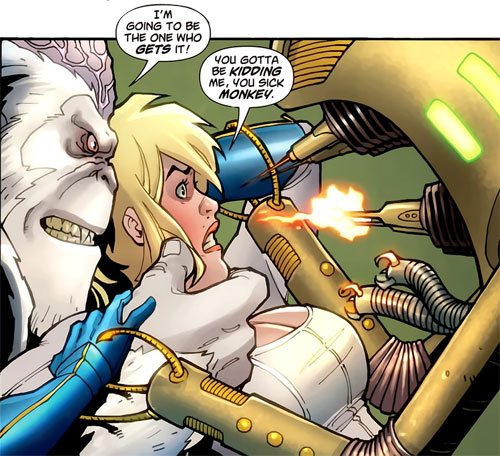
In Gorilla Warfare we see Power Girl face off against the evil Ultra-Humanite, a mad genius trapped in an albino gorilla’s body. He wants to perform a brain transplant operation, taking over Power Girl’s mighty Kryptonian body. Given the blatant cheesecake factored into her character design, this helps get the series off to a properly humorous start.
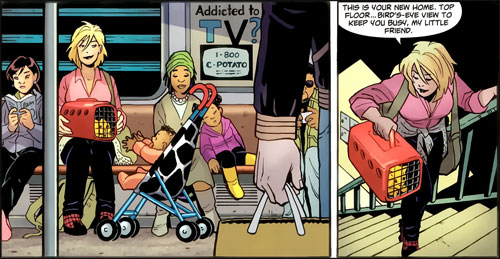
In Space Girls Gone Wild, Power Girl gets caught up in running battle between three alien party girls and a space-cop that’s trying to bring them in for justice. There are explosions and misunderstandings and everything is pretty light-hearted and funny.
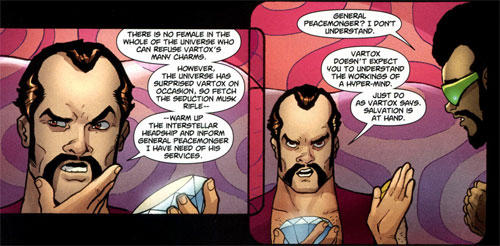
One of the better stories I’ve run into in comics in the past yearh, Lust in Space has Vartox, a hairy-checked macho space-lord from a doomed civilization (the rest of his species has gone sterile) seeks out Power Girl for her… fertility. An excellent flip-side of the first plot arc, a well-intentioned but ignorant male seeks her out for pretty much exactly what you’d expect a free-love stud with an 80’s mustache and a speedo to want from her. There are explosions and misunderstandings.
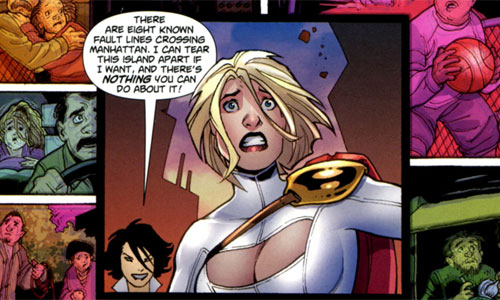
In War on Terra, things come back around to the first story, with the villains seeking to turn Power Girl’s buddy and protégé Terra against her. Throughout the series Terra has been a frequent sidekick both in the super-heroics and civilian down-time, and we get the obligatory “what if they two of them turned on each other” scenario unfolding and resolving itself as you’d want it to. There are explosions but not so much on the misunderstandings
The series does a very good job pacing between rock-em-sock-em caped heroism and super-villainy and the mundane world of a secret identity. Early on, the secret-identity stories did an excellent job highlighting how superhero comics can be analogs to other tales, with the Ultra-Humanite mirrored nicely by an abrasive job interview.
Amanda Conner’s art is much as it was in Terra. The action scenes were enthusiastic and over-the-top. The characters were delightfully expressive, though there is still the tendency to draw pretty females strongly similar to each other. Conner can make two athletic young men look distinctive, but two attractive young women need to be distinguished by hair color and costume.
Due to the cheesecake factor, this may not be something you want up on your bookshelf for all to see, but it’s a fun read. There are a couple of scenes that depict brain surgery or somebody losing an arm a bit more graphically than you’d want from a kid’s comic, but otherwise this here’s a prime example of what used to be good about comics that mostly just doesn’t apply any more. This isn’t grim and edgy. It isn’t littered with big-name cross-overs. It’s just some good (mostly) clean fun.
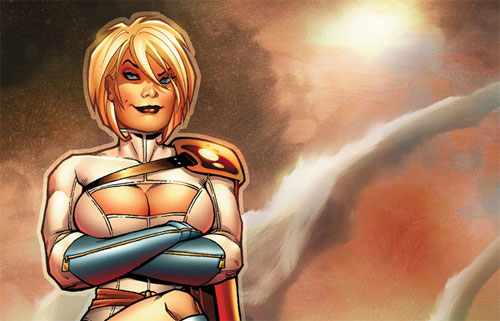
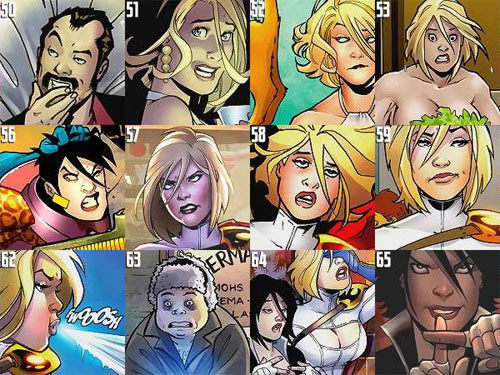
Power Girl has had an unbelievably fun year.
Here’s hoping that Winick can keep up the pace. And for what it’s worth, Generation Lost seems to suggest he just might.